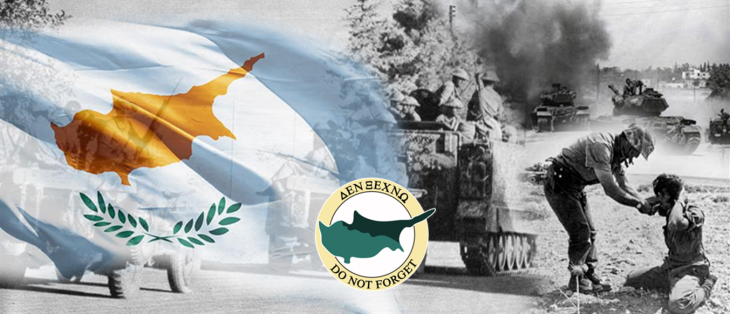UK CYPRIOTS MARK INVASION 45 YEARS ON

Forty-five years ago to this day the Turkish military launched its second offensive against the Republic of Cyprus, in full violation of international law, including the UN Charter, despite the ceasefire that had been agreed.
The Turkish army invaded Cyprus on July 20, 1974, and launched the second phase of the invasion on August 14 of the same year, occupying the best part of Mesaoria, Famagusta, Karpasia and Morphou.
On Sunday 11th August the British-Cypriot community held a commemorative event in conjunction with the Famagusta Association of Great Britain, at St John the Baptist Greek Orthodox Church, Wightman Road. Its president Dr. Vasilis Mavrou and president of the National Federation of Cypriots in the UK Christos Karaolis were in attendance at the event.
The Cyprus High Commissioner Euripides Evriviades who is retiring from his post this month, also present, to address the Church faithful and many visitors on this occasion. He gave a passionate speech about his six years serving the London office. The Cypriot diplomat explained how he tirelessly worked to campaign and enlighten others, on the Cyprus cause.
He underlined the values believed are central to the dispute, with a fairer future, that’s deserved for his Cypriot compatriots.
“All Cypriots Greek-Cypriots, Turkish-Cypriots, Maronites, Latin, Armenian deserve much better… What we want is nothing more and nothing less than other what is given to peace-loving people democracy, human rights and the rule of law, we are not children of a lesser God, we all burn under the same sun, we want democracy, human rights and the rule of law for everyone.” Mr Evriviades said.
To his fellow-Cypriots he urged always carrying the Cyprus flag high, Euripides said, “if we don’t hold our [Cypriot] flag high, then nobody else will respect it.”
He concluded his speech, thanking the Cypriot community of the UK for their continuous support, “[translated in Greek]… I believe you have made me a better human being, I have learnt so much from you [the British-Cypriots].” He also thanked the Cyprus President Nicos Anastasiades for his appointment to the UK post.
The Turkish side continues to disregard calls by the international community relating to Cyprus and continues to hold the city of Famagusta hostage of its illegal military occupation. Dubbed a “ghost town”, Famagusta’s fenced off section – called Varosi – remains to this day deserted, abandoned to the elements.
Turkish troops invaded Cyprus on July 20, 1974, five days after the legal government of the late Archbishop Makarios III was toppled by a military coup, engineered by the military junta then ruling Greece. Two unproductive conferences in Geneva followed; the first between Britain, Greece and Turkey and the second with the additional attendance of Greek Cypriot and Turkish Cypriot representatives. Three weeks after the ceasefire of July 22, and despite the fact that talks were still being held and just as an agreement seemed about to be reached, the Turkish army mounted a second full-scale offensive. As a result, Turkey increased its hold to include the booming tourist resort of Famagusta in the east and the rich citrus-growing area of Morphou in the west.
All in all, almost 37% of the territory of the Republic of Cyprus came under Turkish military occupation. Nearly one-third of the population, some 200,000 Greek Cypriots, were forcibly uprooted from their homes and properties, thousands were killed during the hostilities, over 1,000 persons were listed as missing while thousands of Greek Cypriots and Maronites remained enclaved.
Numerous UN resolutions have demanded respect to the independence, unity and territorial integrity of Cyprus, the return of the displaced to their homes, and the withdrawal of foreign troops from the island, but all resolutions have been ignored by Turkey.
The latest effort to reach a Cyprus settlement will get underway next month: with the Cypriot President Nicos Anastasiades and Turkish-Cypriot leader Mustafa Akinci, to meet with the U.N. secretary-general to map out the next steps toward a hoped-for resumption of formal reunification talks.
United Nations spokesman Aleem Siddique said Anastasiades and Akinci also decided to carry on discussions with U.N. envoy Jane Holl Lute to prepare the framework for “structured and results-oriented” negotiations leading to a peace deal “with a sense of urgency.”
Siddique said the two politicians discussed “in-depth the basic principles” of a potential peace accord.
Repeated rounds of UN-led peace talks have so far failed to yield results. The last round of negotiations, in the summer of 2017, at the Swiss resort of Crans-Montana ended inconclusively.
Article written by London Greek Radio

